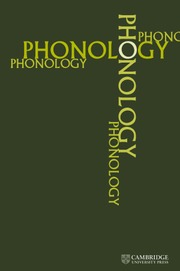Article contents
Input Strictly Local opaque maps
Published online by Cambridge University Press: 01 June 2018
Abstract
This paper gives a computational characterisation of opaque interactions in phonology. Specifically, a range of opaque interactions are shown to be Input Strictly Local (ISL) maps (Chandlee 2014), which are string-to-string functions that determine output based only on contiguous sequences of input symbols. Examples from Baković’s (2007) extended typology of counterfeeding, counterbleeding, self-destructive feeding, non-gratuitous feeding and cross-derivational feeding, as well as a case of fed counterfeeding from Kavitskaya & Staroverov (2010), are all given ISL analyses, which show that these interactions can be computed based on sequences of bounded length in the input. It is discussed how ISL maps are restrictive in their typological predictions, have guaranteed learning results and known methods for generation and recognition, and thus compare favourably to rule-based and constraint-based approaches to these interactions.
Information
- Type
- Articles
- Information
- Copyright
- Copyright © Cambridge University Press 2018
Footnotes
The authors would like to thank the following people for valuable feedback and discussion related to this work: Bill Idsardi, the three anonymous reviewers and audiences at GALANA 2015, GLOW 2015, UPenn, UC Berkeley, UCSD and the University of Chicago.
References
- 9
- Cited by

